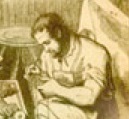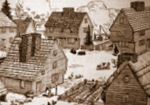from Essex Institute Historical Collection by Essex Institute, Peabody Essex Museum
1. John Kitchen, the first mention of whom we have on 20 March, 1635, when he embarked at Weymouth, England, as the servant (apprentice) of Zachery Bicknell (later of Weymouth, Mass.), aged 21 years, appears to have been born in or about the year 1619, for on 10-10-1661, he, aged about forty-two years, testified in the case of Burton v. Porter.
On 23- 4 -1642, he was granted a 10 acre lot at Salem, and he joined the First Church on 26: 12: 1642. He was a freeman 28 Feb., 1643.
From the first, Kitchen appears to have been a stirring and bold character and appears frequently before the Court for his boldness in speaking out his opinions. In Hutchinson's History of Massachusetts it is recorded that he was fined for showing books "which he was bidden to show the Governour and no other."
In spite of his quarrels with the Puritan authorities, he was frequently on the jury, and on 19-9-1649, he was chosen constable of Salem. A strong character and frequently at war with the Bay government, Kitchen eagerly embraced the doctrines of the Quakers, of which sect his wife was a devoted adherent, and their names constantly occur among those fined for failure to attend the Puritan Church. His wife was the victim at this time of a brutal and ruffianly attack at the hands of that zealous saint, Edmund Batter, whs found her, as he supposed, returning one morning from a Quaker meeting. On 25-9-1662, the Court,
considering ye unworthy and malignant speeches and carriages of John Kitchen in open Court doe see cause to displace him from ye office of sargerit of ye foot company [infantry].
and fined him 30 shillings. The persecution inflicted upon Kitchen and his wife for their religious opinions was very severe, and he paid upwards of £40 sterling in fines for the sin of being a Quaker. John Kitchen was a cordwainer by trade, and died in 1675-6, leaving a goodly estate including considerable realty. His will was dated 20 Dec., 1675; proved 30-4-1676. In it he leaves his house and land to his wife Elizabeth, his orchard and other lands to his son Robert, and mentions his other children. His inventory was taken on 30-4-1676, and amounted to £398 : 4: 00.
Kitchen appears to have had two wives, each named Elizabeth, for upon 26-12-1642, John Kitchen and wife were admitted to the First Church. After the word "wife" in the record is written the word "dead."
Now on 10- 3-1640, Elizabeth Saunders was admitted to the First Church, and after her name is written, evidently later on, "i. e. Kitchen." On 8: 5 mo. 1661,
John Kitchen, shoemaker, and John Saunders, seaman, son in law [step son] to ye said John Kitchen,
sold land to John Williams of Salem in the North Fields. The will of John Sanders, dated on 12 Oct., 1643, proved 28 : 10 mo. 1643, mentions "my father in law Joseph Grafton." The will of Joseph Grafton being defective, was not allowed, but the heirs, on 26 June, 1681, agreed to divide the property according to the will, and in the division we find a bequest to Robert Kitchen of £5, and to his three sisters of 20 shillings each.
On 1 November, 1675, Elizabeth Kitchen, aged 50 years, testified thus, showing she was born in or about 1625. From the above it will appear that she was undoubtedly the child of Capt. Joseph Grafton, although somewhat older than most of his children, and was probably the child of a first wife in England. Elizabeth Kitchen, who should be venerated for her sufferings at the hands of the Bay authorities because of her Quaker principles, was alive as late as 3 March, 1678-9.
Children by first wife Elizabeth:
2. Elizareth, bapt. 12 : 1: 1643, First Church, Salem.
3. Hannah, bapt. 12:1: 1643, First Church, Salem.
He also had probably by this first wife:
4. Joseph, bapt. 20: 2: 1645; probably d. young.
5. John, bapt. 12: 4: 1646; probably d. young.
6. Mary, bapt. 23: 2: 1648; m. 20 Feb., 1665, Timothy Robinson.
John and Elizabeth Sanders (Grafton) Kitchen had:
7. Robert, bapt. 15: 2: 1655.
8. Benjamin, b. 26: 6: 1660; d. 15:
7: 1660.
9. Abigail, m., 3:4: 1669, John Gnppy.
10. Priscilla, m., Oct., 1672, Nathaniel Hunn of Boston.



